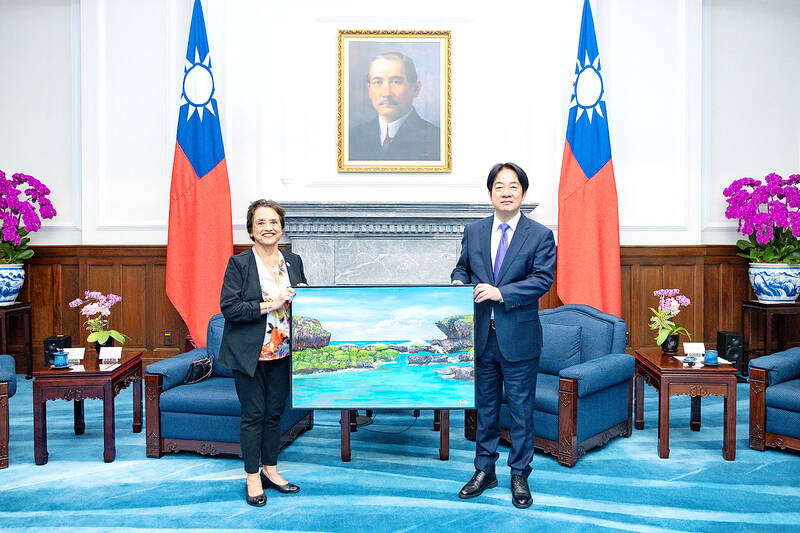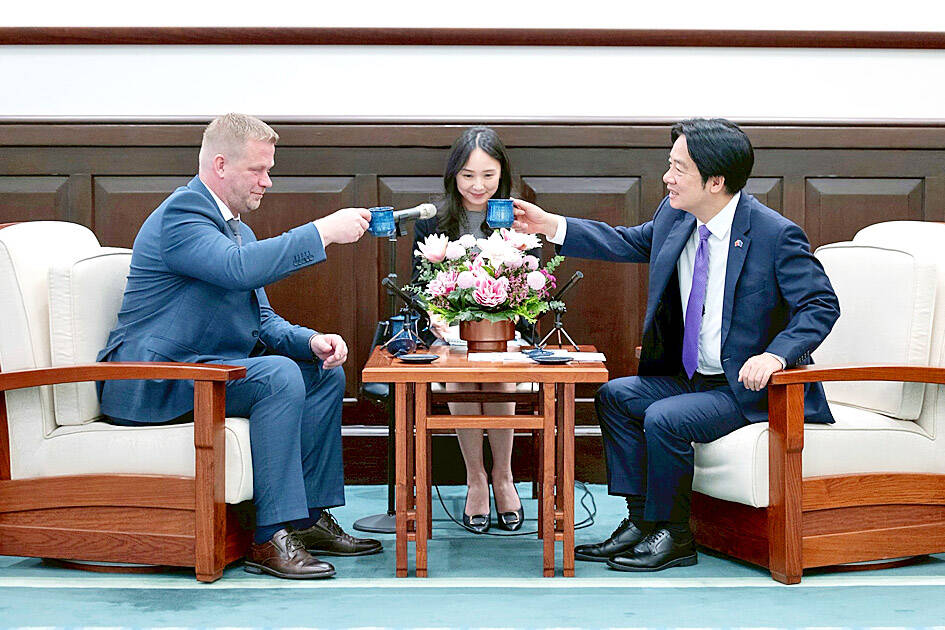President William Lai (賴清德) yesterday called on the European Parliament to support the signing of an economic partnership agreement (EPA) between Taiwan and the EU, citing the potential for enhanced economic security.
An EPA would “not only yield mutually beneficial win-win developments, but also consolidate economic security and boost international competitiveness on both sides,” Lai said during a meeting in Taipei with European Parliament members Reinis Poznaks and Beatrice Timgren.
Highlighting a strong complementarity between Taiwan and the EU in areas such as semiconductors, artificial intelligence and green energy, Lai said that through “our joint efforts, we can create more resilient democratic supply chains, and further contribute to global prosperity and development.”

Photo courtesy of the Presidential Office
Taiwan has been calling for an economic deal with the EU since the tenure of Lai’s predecessor, former president Tsai Ing-wen (蔡英文), underscoring Taipei’s desire to deepen economic and trade ties with Europe.
While the European Parliament has voiced support for negotiating an EPA with Taiwan, the European Commission has remained hesitant on the issue.
During the meeting at the Presidential Office, Lai also thanked the European Parliament for resolutions reaffirming support for Taiwan amid ongoing “provocative military actions” from China, and for recognizing Taiwan as a key democratic partner in the Indo-Pacific region.

Photo courtesy of the Presidential Office
Poznaks, reflecting on his home nation Latvia’s own experience with its “large, aggressive neighbor,” expressed solidarity with Taiwan and stressed the importance of democracies uniting to defend the rule of law.
Seeing China and Russia as using the same playbook through disinformation attacks, Poznaks said it was “crucial for all democracies around the world to stick together and protect our freedoms, values and democracy.”
Timgren echoed similar sentiments, emphasizing the importance of close ties between democratic nations in the face of authoritarian threats, adding that such a demonstration of unity would be “part of [our] defense.”
During their visit from Sunday to Friday, the parliamentarians are also scheduled to meet with Minister of Foreign Affairs Lin Chia-lung (林佳龍), as well as representatives from the legislature, civil society groups and think tanks, the Ministry of Foreign Affairs said.
Separately yesterday, Lai also urged more cooperation beyond Europe during a separate meeting with a delegation led by Guam Governor Lourdes Leon Guerrero, who is on a seven-day visit to Taiwan this week.
“The world is rapidly changing and tensions in the Indo-Pacific continue to rise, but if we combine our strengths, come together as one and enhance cooperation, we can maintain peace, stability and prosperity in our region,” Lai said.
He added that Taiwan looked forward to working with Guam and the US to further strengthen economic ties and explore more opportunities for industrial cooperation.

PREPAREDNESS: Given the difficulty of importing ammunition during wartime, the Ministry of National Defense said it would prioritize ‘coproduction’ partnerships A newly formed unit of the Marine Corps tasked with land-based security operations has recently replaced its aging, domestically produced rifles with more advanced, US-made M4A1 rifles, a source said yesterday. The unnamed source familiar with the matter said the First Security Battalion of the Marine Corps’ Air Defense and Base Guard Group has replaced its older T65K2 rifles, which have been in service since the late 1980s, with the newly received M4A1s. The source did not say exactly when the upgrade took place or how many M4A1s were issued to the battalion. The confirmation came after Chinese-language media reported

The Taiwanese passport ranked 33rd in a global listing of passports by convenience this month, rising three places from last month’s ranking, but matching its position in January last year. The Henley Passport Index, an international ranking of passports by the number of designations its holder can travel to without a visa, showed that the Taiwan passport enables holders to travel to 139 countries and territories without a visa. Singapore’s passport was ranked the most powerful with visa-free access to 192 destinations out of 227, according to the index published on Tuesday by UK-based migration investment consultancy firm Henley and Partners. Japan’s and

A Ministry of Foreign Affairs official yesterday said that a delegation that visited China for an APEC meeting did not receive any kind of treatment that downgraded Taiwan’s sovereignty. Department of International Organizations Director-General Jonathan Sun (孫儉元) said that he and a group of ministry officials visited Shenzhen, China, to attend the APEC Informal Senior Officials’ Meeting last month. The trip went “smoothly and safely” for all Taiwanese delegates, as the Chinese side arranged the trip in accordance with long-standing practices, Sun said at the ministry’s weekly briefing. The Taiwanese group did not encounter any political suppression, he said. Sun made the remarks when

BROAD AGREEMENT: The two are nearing a trade deal to reduce Taiwan’s tariff to 15% and a commitment for TSMC to build five more fabs, a ‘New York Times’ report said Taiwan and the US have reached a broad consensus on a trade deal, the Executive Yuan’s Office of Trade Negotiations said yesterday, after a report said that Washington is set to reduce Taiwan’s tariff rate to 15 percent. The New York Times on Monday reported that the two nations are nearing a trade deal to reduce Taiwan’s tariff rate to 15 percent and commit Taiwan Semiconductor Manufacturing Co (TSMC, 台積電) to building at least five more facilities in the US. “The agreement, which has been under negotiation for months, is being legally scrubbed and could be announced this month,” the paper said,